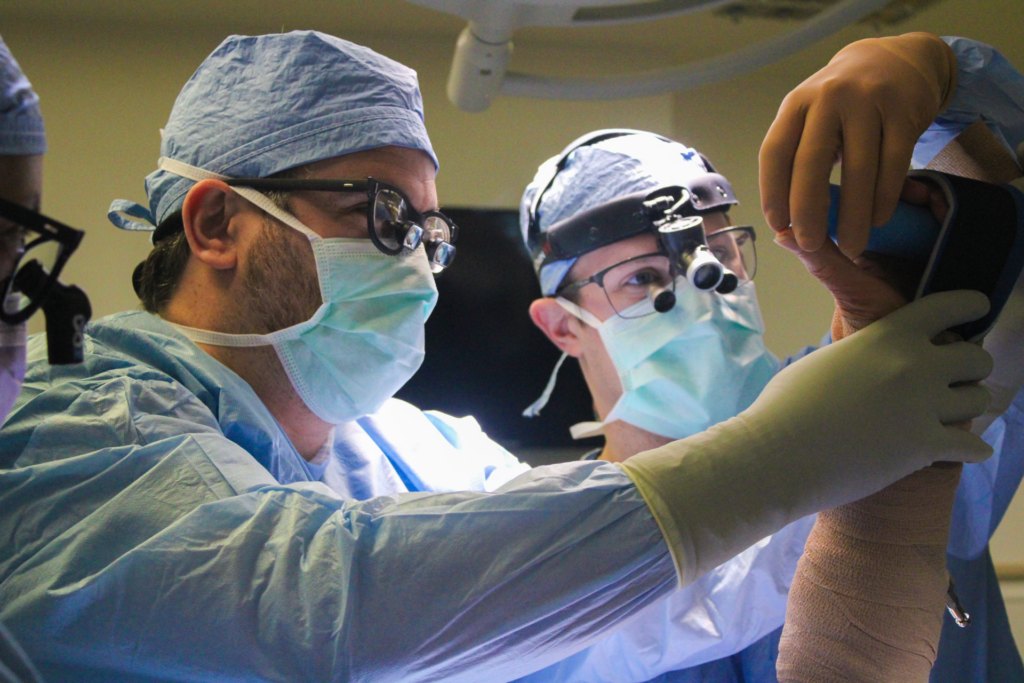S+S, Spring 2025
The Division of Head & Neck Surgery in the Department of Otolaryngology-Head & Neck Surgery at the University of Pittsburgh has a strategic plan to create a world-renowned center within UPMC Hillman Cancer Center. The vision is to accelerate finding a cure for head and neck cancer and mitigating treatment-related toxicities through survivorship.
Division Chief of Head and Neck Surgical Oncology & Microvascular Reconstruction, Dr. Matthew Spector, MD, FACS, called the HNS research initiatives diverse. “While the head and neck group work together to take care of patients with multidisciplinary care, each of us has our own area of research that we focus on to help bring the field forward,” he said.
The translational research program, anchored by UPMC Hillman Cancer Center and the Head and Neck Cancer SPORE (Specialized Program of Research Excellence) grant, has been one of the leading programs in the world for decades. Dr. José P. Zevallos, MD, MPH, FACS, the Eugene N. Myers, MD Professor and Chair of the Department, and Interim Deputy Director of UPMC Hillman Cancer Center and Dr. Heath Skinner, MD, co-lead this, which provides the basic infrastructure for tissue collection and biobanking.
The first main part of SPORE is the clinical trials, run by Dr. Dan Paul Zandberg, MD, Dr. Christopher Wilke, MD, and Dr. Kevin J. Contrera, MD, MPH. They are focused on bringing national trials to UPMC. Dr. Contrera’s main type of research is response adapted therapy, which looks into how patients respond to a neoadjuvant chemotherapy or immunotherapy, and how to adapt their treatment to the therapy they received.
The UPMC Survivorship Clinic is run by Marci Lee Nilsen, PhD, MSN, RN, CHPN, FAAN. She has a grant to examine the outcomes of patients after surgery, radiation, and chemotherapy for HNC, specifically looking at radiation-induced fibrosis – especially in the neck. She is looking at tailored treatments to improve quality of life and patient outcomes and is trying to broaden the clinic so patients can go to satellite locations.
At Shadyside Hospital, Otolaryngology Unit Director, Seungwon Kim, MD, specializes in advanced skin cancer, oral cancer, and thyroid cancer. He is developing antiangiogenic and targeted therapy for head and neck cancer.
Dr. Spector and Dr. Shaum Sridharan, MD, conduct research in the functional outcomes program, such as determining the right flap for the right patient and ensuring that what is done during reconstruction is translatable for the future. Their goals are to maximize the functional outcome of surgery and afterwards, so patients can speak, swallow, and participate in society the way they want.
The epidemiology group looks at the broader picture of head and neck cancer, like exploring socio economic status and modifiable risk factors. Dr. Jessica Maxwell, MD, MPH, FACS, Chief of Otolaryngology at the VA, has publications looking at disparities at the VA and how they translate into care that is delivered. Dr. Angela Mazul, PhD, MPH, is in the clinic doing samples with patients, looking at biomarkers as well as the bigger epidemiology of how HNC is treated. Dr. Zevallos is researching cancer biomarkers and HPV negative drain fluid to understand what cancers need to be escalated with therapy.
Dr. Raja Seethala, MD, Simion Chiosea, MD, and Diana Bell, MD, help run the biospecimen repository, which is part of SPORE. The organ-specific database has collected detailed clinical and pathologic information from more than 12,000 patients followed for over 30 years. This allows researchers to really understand the biomarker-based understanding of cancer and cancer genomics.
Dr. Spector has a RO1 grant looking at HPV genetic integration. “Sometimes these cancers become hard to treat based on where the genome is altered,” he said. “My overarching project is to look at where those integration events are happening and how they predict the chance of cure.”
Two surgeon scientists have recently been recruited. Dr. Joshua Smith’s research is focused on unraveling mechanisms of tumor immune evasion and discovery of translational biomarkers of response to immunotherapies in head and neck cancers. Dr. Steven Chinn’s research is deeply translational, exploring the molecular genetics of head and neck cancers, including oral cavity cancer and HPV+ pharyngeal cancer and larynx cancer, with a particular emphasis on cancer plasticity, transdifferentiation, and deconstructing the tumor microenvironment through the integration of spatial-omics, digital pathology/virtual staining, and artificial intelligence.
Despite the current uncertainty of NIH funding, the HNS group is still extremely active and pursuing research from current grants and applying for new grants, both within the NIH and without. “We’re using our foundation resources to help leverage other kinds of novel mechanisms of funding through philanthropy,” Dr. Spector said. “Overall, we’re still going full steam ahead to try to defeat head and neck cancer.”
